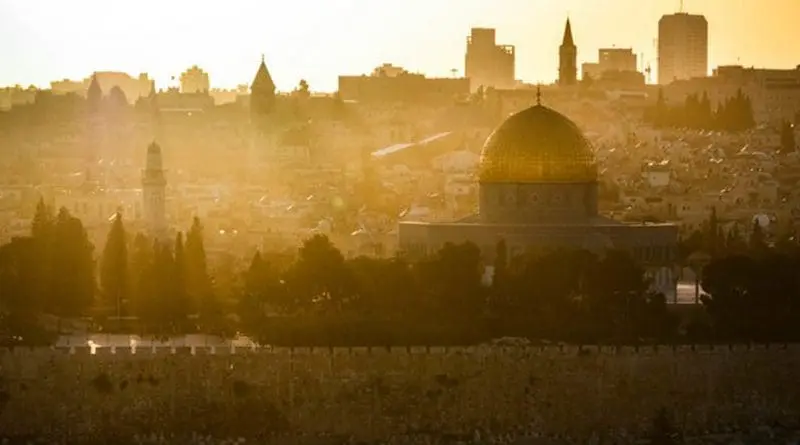Where’s The Positive Thinking About Israel-Palestine? – OpEd
Israel goes to the polls on Tuesday, 9 April. Ahead of the general election, old political parties like Likud and Labor, and newly-formed ones like Israel Resilience and New Right, have been publishing their platforms – the policies on which they seek the support of voters.
Anyone scrutinizing these party platforms for new outside-the-box proposals for tackling the Israel-Palestine situation will search in vain. Not one of the political parties, new or old, is offering any new thinking on the perennial problem facing the nation and the region.
The Likud leadership, with advance knowledge of what is contained in the long-awaited, and long-delayed, Trump peace deal, may be relying on just that. Typically trumpeted in advance as “the deal of the century”, it will probably receive an equivocal reception when it is eventually unveiled after the general election. Palestinian Authority (PA) president Mahmoud Abbas has already condemned it sight unseen, while recent reports suggest that its main hoped-for supporter, Saudi Arabia, has been laying down conditions before agreeing to come out in its defense.
So there is room enough, and to spare, for some bold, positive thinking about how the long-standing problem might be resolved.
On 3 September 2018 the Palestinian Information Center, known as Palinfo, published this: “During a meeting with an Israeli delegation that visited Ramallah on Sunday, Abbas said that senior US administration officials, Jared Kushner and Jason Greenblatt, asked him recently about his opinion of a ‘confederation with Jordan’. “I said yes to the offer, but I want a three-way confederation with Jordan and Israel,” said Abbas.”
The statement was more or less ignored by commentators in the media.
Abbas has a good deal of reason on his side. Prowling around the PA stockade is Hamas, ruling over nearly two million Palestinians in Gaza, hungry for power in the West Bank, and harrying Abbas for a decade. Every effort to effect a reconciliation between Hamas and Fatah, and they are numerous, have failed. The PA leadership is rightly worried about losing power to Hamas, either by way of a military coup or even via democratic elections, for Hamas has a fair following among the Palestinian public which is not enamoured of the inadequacies of the PA. The latest poll of Palestinian opinion shows no less than 80 percent of the public believe that PA institutions are riddled with corruption.
The poll, held in December 2018, revealed a significant rise in Hamas’s popularity and that of its leader, Ismail Haniyeh. If only Abbas and Haniyeh were nominated in new presidential elections, Abbas would receive 42 percent and Haniyeh 49 percent of the vote, compared to 47 percent for Abbas and 45 percent for Haniyeh in the previous poll in September 2018.
Like it or not, Abbas realizes that if ever a sovereign Palestine came into being, it would need stronger defences against “the enemy within” than his own resources could provide – one powerful reason for supporting the confederation concept.
An even more fundamental issue militates against the classic two-state solution. The PA has painted itself into a corner. Vying with Hamas on the one hand, and extremists within its own Fatah party on the other, it has glorified the so-called “armed struggle”, making heroes of those who undertake terrorist attacks inside Israel, and reiterating the message in the media and the schools that all of Mandate Palestine is Palestinian and the creation of Israel was a national disaster. The end-result of its own narrative is that no Palestinian leader dare sign a peace agreement unilaterally with Israel based on the two-state solution. The consequent backlash from within the Palestinian world, to say nothing of the personal fear of assassination, have made it impossible.
The political reality is that any viable solution would have to be based on an Arab-wide consensus, within which Palestinian extremist objections could be absorbed. In recent times moderate Arab states, led perhaps by Saudi Arabia, have begun to perceive Israel as an ally against Iranian ambitions, both nuclear and political. The US-led summit on Middle East security, held in Warsaw on 13 and 14 February 2019, focused its attention on the threat posed by Iran to the Arab world. The PA, fearful that the Israel-Palestine issue was being sidelined, declined an invitation to attend and tried, unsuccessfully, to persuade Arab nations to boycott the conference.
It seems increasingly likely that the Arab League could prove a broker for peace acceptable to all parties. Under its shield the PA could participate, with Jordan and Israel, in bringing Abbas’s concept of a three-state confederation to reality. This new entity – a Confederation of Jordan, Israel and Palestine – could come into legal existence simultaneously with a new sovereign Palestine that ideally would include Gaza.
The negotiations to bring about this kind of political solution would be lengthy, intensive and complex. But if successful, the end-result would be eminently worthwhile. A Jordan-Israel-Palestine confederation, geared to defending itself and its constituent sovereign states, could also be dedicated to cooperating in the fields of commerce, infrastructure and economic development. From the moment it came into legal existence, the confederation could make it abundantly clear that any subsequent armed opposition, from whatever source, including Hamas, would be disciplined and crushed from within. The Israel Defense Forces would act in concert with the defence forces of the other states to guarantee the security of Israel and that of the confederation as a whole.
A confederation of three sovereign states, dedicated to providing high-tech security but also future economic growth and prosperity for all its citizens – this is a configuration offering the possibility of a peaceful and thriving Middle East. Surely it is attractive enough for at least one of Israel’s contending political groupings to adopt as its proposed policy in the forthcoming election?

